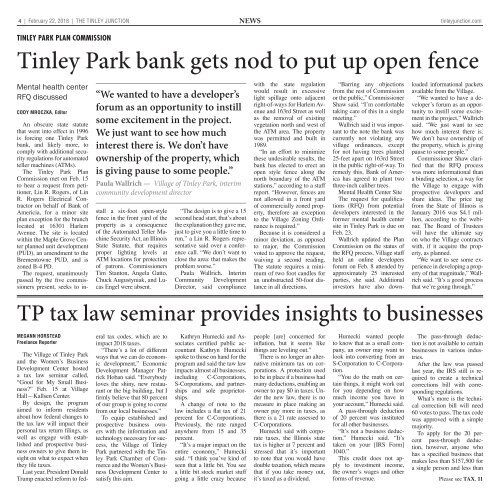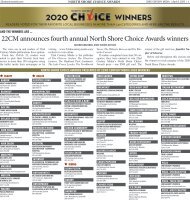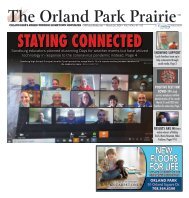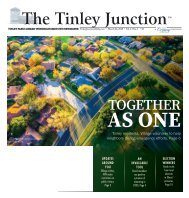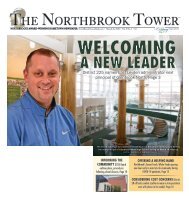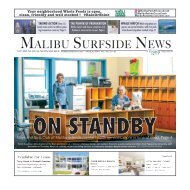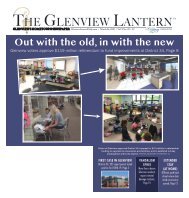TP_022218
The Tinley Junction 022218
The Tinley Junction 022218
Create successful ePaper yourself
Turn your PDF publications into a flip-book with our unique Google optimized e-Paper software.
4 | February 22, 2018 | The tinley junction News<br />
tinleyjunction.com<br />
Tinley Park Plan Commission<br />
Tinley Park bank gets nod to put up open fence<br />
Mental health center<br />
RFQ discussed<br />
Cody Mroczka, Editor<br />
“We wanted to have a developer’s<br />
forum as an opportunity to instill<br />
some excitement in the project.<br />
We just want to see how much<br />
interest there is. We don’t have<br />
ownership of the property, which<br />
is giving pause to some people.”<br />
Paula Wallrich — Village of Tinley Park, interim<br />
community development director<br />
An obscure state statute<br />
that went into effect in 1996<br />
is forcing one Tinley Park<br />
bank, and likely more, to<br />
comply with additional security<br />
regulations for automated<br />
teller machines (ATMs).<br />
The Tinley Park Plan<br />
Commission met on Feb. 15<br />
to hear a request from petitioner,<br />
Lin R. Rogers, of Lin<br />
R. Rogers Electrical Contractor<br />
on behalf of Bank of<br />
Americia, for a minor site<br />
plan exception for the branch<br />
located at 16301 Harlem<br />
Avenue. The site is located<br />
within the Maple Grove Center<br />
planned unit development<br />
(PUD), an amendment to the<br />
Brementowne PUD, and is<br />
zoned B-4 PD.<br />
The request, unanimously<br />
passed by the five commissioners<br />
present, seeks to install<br />
a six-foot open-style<br />
fence in the front yard of the<br />
property as a consequence<br />
of the Automated Teller Machine<br />
Security Act, an Illinois<br />
State Statute, that requires<br />
proper lighting levels at<br />
ATM locations for protection<br />
of patrons. Commissioners<br />
Tim Stanton, Angela Gatto,<br />
Chuck Augustyniak, and Lucas<br />
Engel were absent.<br />
“The design is to give a 15<br />
second head start, that’s about<br />
the explanation they gave me,<br />
just to give you a little time to<br />
run,” a Lin R. Rogers representative<br />
said over a conference<br />
call. “We don’t want to<br />
close the area: that makes the<br />
problem worse.”<br />
Paula Wallrich, Interim<br />
Community Development<br />
Director, said compliance<br />
with the state regulation<br />
would result in excessive<br />
light spillage onto adjacent<br />
right-of-ways for Harlem Avenue<br />
and 163rd Street as well<br />
as the removal of existing<br />
vegetation north and west of<br />
the ATM area. The property<br />
was permitted and built in<br />
1989.<br />
“In an effort to minimize<br />
these undesirable results, the<br />
bank has elected to erect an<br />
open style fence along the<br />
north boundary of the ATM<br />
stations,” according to a staff<br />
report. “However, fences are<br />
not allowed in a front yard<br />
of commercially zoned property,<br />
therefore an exception<br />
to the Village Zoning Ordinance<br />
is required.”<br />
Because it is considered a<br />
minor deviation, as opposed<br />
to major, the Commission<br />
voted to approve the request,<br />
waiving a second reading.<br />
The statute requires a minimum<br />
of two foot candles for<br />
an unobstructed 50-foot distance<br />
in all directions.<br />
“Barring any objections<br />
from the rest of Commission<br />
or the public,” Commissioner<br />
Shaw said. “I’m comfortable<br />
taking care of this in a single<br />
meeting.”<br />
Wallrich said it was important<br />
to the note the bank was<br />
currently not violating any<br />
village ordinances, except<br />
for not having trees planted<br />
25-feet apart on 163rd Street<br />
in the public right-of-way. To<br />
remedy this, Bank of America<br />
has agreed to plant two<br />
three-inch caliber trees.<br />
Mental Health Center Site<br />
The request for qualifications<br />
(RFQ) from potential<br />
developers interested in the<br />
former mental health center<br />
site in Tinley Park is due on<br />
Feb. 23.<br />
Wallrich updated the Plan<br />
Commission on the status of<br />
the RFQ process. Village staff<br />
held an online developers<br />
forum on Feb. 8 attended by<br />
approximately 25 interested<br />
parties, she said. Additional<br />
investors have also downloaded<br />
informational packets<br />
available from the Village.<br />
“We wanted to have a developer’s<br />
forum as an opportunity<br />
to instill some excitement<br />
in the project,” Wallrich<br />
said. “We just want to see<br />
how much interest there is.<br />
We don’t have ownership of<br />
the property, which is giving<br />
pause to some people.”<br />
Commissioner Shaw clarified<br />
that the RFQ process<br />
was more informational than<br />
a binding selection, a way for<br />
the Village to engage with<br />
prospective developers and<br />
share ideas. The price tag<br />
from the State of Illinois is<br />
January 2016 was $4.1 million,<br />
according to the webinar.<br />
The Board of Trustees<br />
will have the ultimate say<br />
on who the Village contracts<br />
with, if it acquire the property,<br />
as planned.<br />
“We want to see some experience<br />
in developing a property<br />
of that magnitude,” Wallrich<br />
said. “It’s a good process<br />
that we’re going through.”<br />
<strong>TP</strong> tax law seminar provides insights to businesses<br />
Megann Horstead<br />
Freelance Reporter<br />
The Village of Tinley Park<br />
and the Women’s Business<br />
Development Center hosted<br />
a tax law seminar called,<br />
“Good for My Small Business?”<br />
Feb. 15 at Village<br />
Hall—Kallsen Center.<br />
By design, the program<br />
aimed to inform residents<br />
about how federal changes to<br />
the tax law will impact their<br />
personal tax return filings, as<br />
well as engage with established<br />
and prospective business<br />
owners to give them insight<br />
on what to expect when<br />
they file taxes.<br />
Last year, President Donald<br />
Trump enacted reform to federal<br />
tax codes, which are to<br />
impact 2018 taxes.<br />
“There’s a lot of different<br />
ways that we can do economic<br />
development,” Economic<br />
Development Manager Patrick<br />
Hoban said. “Everybody<br />
loves the shiny, new restaurant<br />
or the big building, but I<br />
firmly believe that 80 percent<br />
of our group is going to come<br />
from our local businesses.”<br />
To equip established and<br />
prospective business owners<br />
with the information and<br />
technology necessary for success,<br />
the Village of Tinley<br />
Park partnered with the Tinley<br />
Park Chamber of Commerce<br />
and the Women’s Business<br />
Development Center to<br />
satisfy this aim.<br />
Kathryn Humecki and Associates<br />
certified public accountant<br />
Kathryn Humecki<br />
spoke to those on hand for the<br />
program and said the taw law<br />
impacts almost all businesses,<br />
including C-Corporations,<br />
S-Corporations, and partnerships<br />
and sole proprietorships.<br />
A change of note to the<br />
law includes a flat tax of 21<br />
percent for C-Corporations.<br />
Previously, the rate ranged<br />
anywhere from 15 and 35<br />
percent.<br />
“It’s a major impact on the<br />
entire economy,” Humecki<br />
said. “I think you’ve kind of<br />
seen that a little bit. You see<br />
a little bit stock market stuff<br />
going a little crazy because<br />
people [are] concerned for<br />
inflation, but it seems like<br />
things are leveling out.”<br />
There is no longer an alternative<br />
minimum tax on corporations.<br />
A protection used<br />
to be in place if a business had<br />
many deductions, enabling an<br />
owner to pay $0 in taxes. Under<br />
the new law, there is no<br />
measure in place making an<br />
owner pay more in taxes, as<br />
there is a 21 rate assessed to<br />
C-Corporations.<br />
Humecki said with corporate<br />
taxes, the Illinois state<br />
tax is higher at 7 percent and<br />
stressed that it’s important<br />
to note that you would have<br />
double taxation, which means<br />
that if you take money out,<br />
it’s taxed as a dividend.<br />
Humecki wanted people<br />
to know that as a small company,<br />
an owner may want to<br />
look into converting from an<br />
S-Corporation to C-Corporation.<br />
“You do the math on certain<br />
things, it might work out<br />
for you depending on how<br />
much income you have in<br />
your account,” Humecki said.<br />
A pass-through deduction<br />
of 20 percent was instituted<br />
for all other businesses.<br />
“It’s not a business deduction,”<br />
Humecki said. “It’s<br />
taken on your [IRS Form]<br />
1040.”<br />
This credit does not apply<br />
to investment income,<br />
the owner’s wages and other<br />
forms of revenue.<br />
The pass-through deduction<br />
is not available to certain<br />
businesses in various industries.<br />
After the law was passed<br />
last year, the IRS still is required<br />
to create a technical<br />
corrections bill with corresponding<br />
regulations.<br />
What’s more is the technical<br />
correction bill will need<br />
60 votes to pass. The tax code<br />
was approved with a simple<br />
majority.<br />
To apply for the 20 percent<br />
pass-through deduction,<br />
however, anyone who<br />
has a specified business that<br />
makes less than $157,500 for<br />
a single person and less than<br />
Please see Tax, 11


